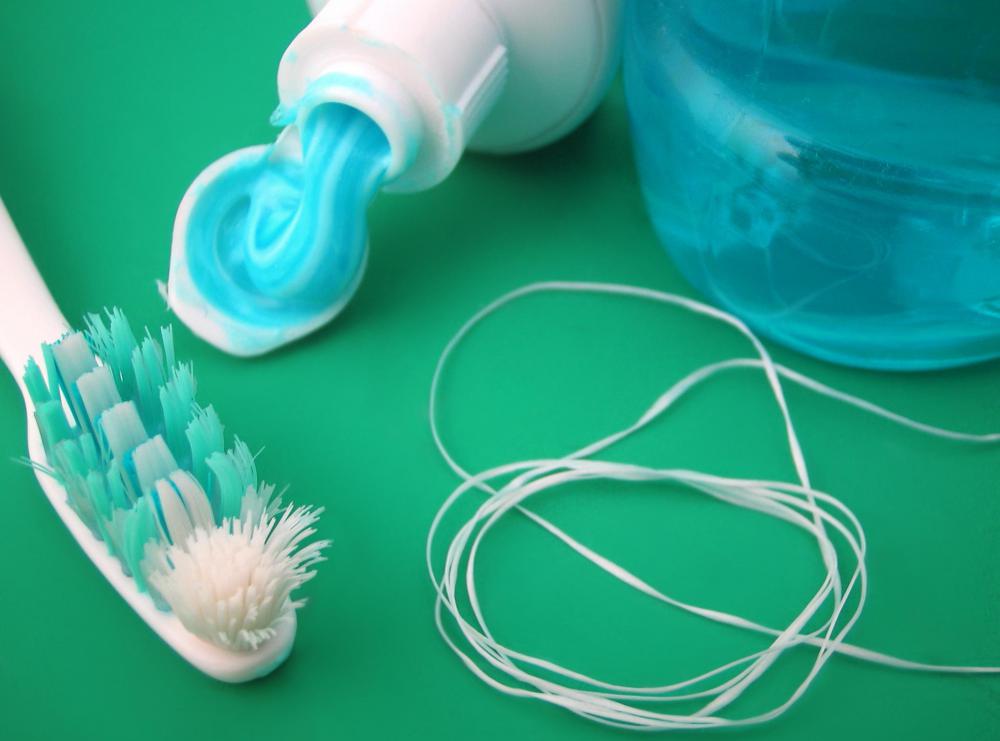At TheHealthBoard, we're committed to delivering accurate, trustworthy information. Our expert-authored content is rigorously fact-checked and sourced from credible authorities. Discover how we uphold the highest standards in providing you with reliable knowledge.
What is a Periodontal Pocket?
A periodontal pocket is an unusually deep gap in the space between the surrounding gums, called the gingival sulcus. When the sulcular depth exceeds 0.118 inch (3 mm), regular brushing cannot effectively remove debris from the area. At this point, dental intervention is necessary in order to thoroughly clean the area. If a deep gingival sulcus is not attended to, debris build-up could lead to a weakened tooth due to loosening of the attachment fibers that hold teeth in place.
If attachment fibers have not been weakened due to a deepened sulcus, the periodontal build-up is referred to as a gingival pocket. This pocket can be reversed by changing basic oral hygiene habits. If the attachment fibers have been damaged as a result of a deepened gingival pocket, then the area is referred to as a periodontal pocket.

These pockets are discovered during a dental examination, when the area is probed. Since the gums in a pocket are extremely sensitive, the slightest amount of probing will produce inflammation and bleeding. This condition must be attended to immediately in order to remove any bacteria that could cause an infection.
Removing debris and bacteria from this space requires a number of steps. Dental professionals first use scaling and debridement techniques to remove as much bacteria as possible. If removal of debris is not possible without surgery, a dental professional may opt to perform root planning, which involves removing the bacteria mechanically. This procedure often requires multiple dental visits, and patients may be given local anesthesia. On occasion, a patient's occlusion — the way the teeth fit together when closed — might also be adjusted. Following the successful removal of bacteria, patients must adhere to a strict dental cleaning routine.

Patients who have been treated for periodontal pockets are required to visit with a dental professional every three months to thoroughly clean the affected area and to ensure that the area does not become repopulated with bacteria. In addition, a regular brushing routine should be adjusted in order to prevent further problems.
If an effective dental regimen is not adopted, patients risk further infection and the development of more periodontal pockets, which will require additional probing, surgery, and cleaning. In order to prevent any kind of oral bacteria from forming, regular dental check-ups are recommended. In most cases, oral bacteria build-up can be avoided if it is noted in a timely manner.
There are some home remedies that will effectively remove some bacteria from the infected pocket areas, though these homeopathic solutions cannot remove calculus formations, rendering these solutions short-lived.
AS FEATURED ON:
AS FEATURED ON:















Discussion Comments
I have had all the treatments over the last 20 years. The most effective is a water pic type device and once a week or so. Put a tiny bit of salt in the water.
I went for years without flossing on a regular basis and my teeth and gums would bleed easily. I would floss a few days before my appointment, hoping that would help, but they always knew!
I told them it was hard to teach an old dog new tricks, but made a conscious effort to begin flossing every day. I can't believe how much of a difference it has made in my teeth.
They no longer bleed like they did before and I haven't had to worry about periodontal disease pockets since I started this routine.
If I am on vacation and skip a few days, my teeth and gums don't feel as clean or fresh. Now when I go for my appointments, they don't have to ask me if I am flossing. They can tell just by looking at my teeth.
@SarahSon - As far as plaque building up, I know some people get that much easier than others. I see my dentist on a regular basis, but I have to be seen every 3 months because my plaque builds up so fast.
I could stretch it to 6 months, but can hardly stand how my teeth feel by then. At each visit my dentist checks the periodontal pocket depth of my teeth.
I find that poking around my gums to be uncomfortable, but understand what he is looking for.
This gives him a good indication of the overall health of my teeth and also tells him if I have been doing my flossing every day.
For almost a year I was on a three month schedule to keep on top of things. I also had a lot of plaque that had built up, and it took more than one visit to get all of that removed.
Now I am back on a six month schedule and feel much better about everything. If I have to go without dental insurance again, I will find a way to pay for regular dentist visits.
I think you end up spending more money when you put off going for so long than you do if you keep up with it on regular basis.
Post your comments